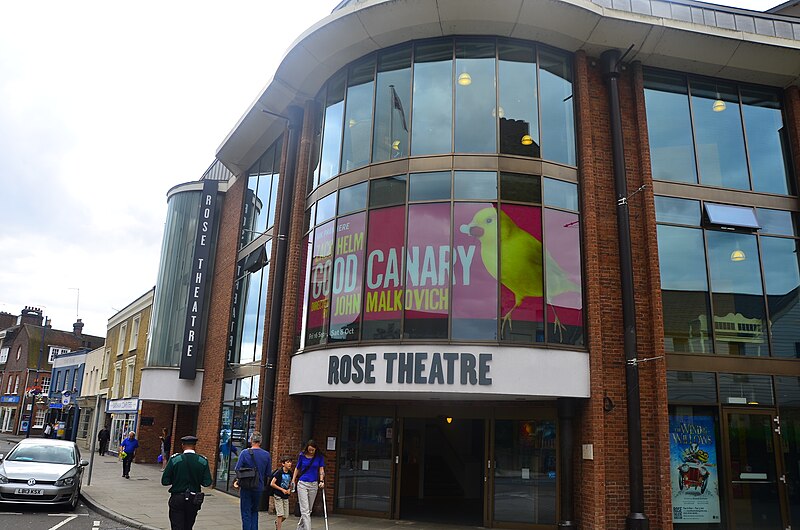Covid-19 has changed the landscape for the The Rose Theatre in Kingston, and many others around the country.
The Rose Theatre in Kingston-upon-Thames is the ‘largest producing theatre in south west London’ and it aims to be ‘famous for drama, fully engaged with the local community and financially sustainable’.
Lucy Morrel, director of learning and participation at The Rose Theatre in Kingston-Upon-Thames, explained the impact and what could be done to get theatres back to pre-pandemic standards.
She said: “I think that Covid-19 had a huge impact on people feeling safe but also re-evaluating what was important to them and I think that had an effect on theatre because often it can be a kind of extra.”
Morrel recognised that theatre is not seen as an essential for a lot of families, however, in order for it to be a thriving industry, people need to return to theatres, starting with young people.
She suggests that for a lot of children, joining theatre classes that the Rose Theatre runs would improve their social skills and educate them about global issues.
Morrel said: “It’s about public speaking, it’s about confidence, it’s about meeting people, engaging with people, building those softer skills and then in terms of watching theatre, I think, theatre reflects the world around us and so it’s an amazing way to look at politics and to look at culture.”
Furthermore, these challenges are not only faced by the Rose Theatre. On a wider scale, Morrel believed theatres are adapting what they show or teach around the curriculum.
She explained: “They are thinking about what work they can do now that fits in with school curriculums so based on books they study, topics or themes because I think that will be a really strong and helpful way of getting kids back into theatre and that’s something we do a lot here at The Rose.”
While theatres have progressed since lockdown, there’s still a long way to go and the future of theatres still remains unclear, however, changes to accessibility have made a massive impact.
The Rose Theatre, like many arts institutions, has faced significant financial challenges in the aftermath of Covid-19.
Across the country, many theatres are struggling to stay afloat and many permanently shut down during the multiple lockdowns we had between 2020-2022.
Funding bursaries is a continuous struggle, requiring persistent fundraising efforts to ensure that no young person is excluded from participating in theatre activities due to financial constraints.
The theatre runs a bursary scheme to ensure inclusivity, covering fees for youth who face financial barriers, access needs, or have learning difficulties by providing discounted tickets for schools and for every ten children, one teacher goes for free.
Morrel highlighted the ongoing struggles of securing funding for their extensive outreach and participatory programmes.
Morrel said: “A lot of our work that we do at The Rose has to be funded for, so we have to send off a big application to places like the Arts Council or individual funders, and you have to make sure you’re getting the right information across.
“It’s a massive challenge and it’s faced by all theatres and all participatory departments.”
She advocates for a restructuring in funding approaches, suggesting separate, dedicated funds for participatory arts and production support to alleviate some of these pressures.
She added: “Unfortunately, funding productions is a real issue right now. So it has to be two separate pots, one for participation in arts and also supporting theatres putting on amazing productions.”
The financial challenges faced by the Rose Theatre are part of a wider trend in the arts sector, which has been dealing with cuts in funding and higher costs.
Many theatres and arts organisations depend on grants and donations to keep their programs running, especially those that reach out to diverse and underrepresented groups.
The provision of this aid also helps to create extra jobs for people in the local community, with Morrel saying that it opens up new positions at the Rose Theatre.
The situation at the Rose Theatre highlights the need for a more sustainable and fair funding model for the arts, one that supports both community engagement and artistic quality.
The Rose Theatre has a very heavy emphasis on involving as many people as possible in all that it does, making sure that anyone who visits can take the most from the experience.
One of the features that make the theatre unique is that they allow guide dogs at the shows, which demonstrates the importance of accessibility to them.
This has been a feature of the Rose Theatre throughout its 16-year history and is utilised once or twice for every big show that they put on.
Something that is changing is the fact the theatre is now allowing support animals, as well as dogs, to ensure that as many people can experience a trip to the theatre as possible.
Morrel said: “It is probably something that all theatres could be doing better at making sure that everyone knows that you can bring your guide dog and support animals.”
The Rose Theatre does this with a picture of a dog on their signage. This could be a great step forward into ensuring that everyone, no matter what condition they may be in, can visit the theatre while feeling comfortable in the environment that they are in.
Morrel said “We want to make sure that theatre is something that is accessible and isn’t something that feels elite or separate.’’
She spoke on the unique array of performances offered at the Rose Theatre.
It’s clear that after Covid-19, many areas have had to rebuild a positive community after two years of little social interaction in lockdown. This is something that the Rose Theatre feels strongly about.
The Rose Theatre has introduced audio described, relaxed, BSL and captioned performances.
All performances that are reiterated by Morrel create an inclusive and accessible space for all, even those that struggle with socio-economic, neurodivergent, or physical barriers that may in other theatres make them feel like a ‘nuisance’.
The introduction of classes and performances tailored for all inkeeps with the new focus of theatres, inclusivity.
The Rose Theatre makes it clear that the physical environment of the theatre must reflect this.
Morrel spoke on the introduction of 10 designated spaces for wheelchairs and any kind of machinery that goes along with them.
The Rose Theatre’s learning curriculum also sets an example for the theatres of the future with its positive, inclusive and welcoming attitude.
The theatre has pushed forward a welcoming atmosphere with classes ranging from young children developing their communication skills to over 55s who want company and social activity during the day.
Morrel talked about how carers struggle to come to evening classes, so she made a class for over 55s and carers who come together during the daytime.
She said: “The aims [for the class] are about people coming together, making friends and keeping the mind and body physically active.”
This attitude is vital post-Covid-19 for retired people to meet each other within a community weekly and reap the mental and physical benefits of having fun with people in their age range.
Morrel also mentioned how the attitudes towards classics adapted into modern plays have evolved through the community at the Rose Theatre.
She said: “Parents love Shakespeare.”
Nothing that many children signed up to do ‘Midsummer Night’s Dream’.
Directors also love adapting Shakespearean plays with the Rose Theatre’s direct heritage to the Shakespearean rose.
Classic novels have become surprisingly popular in their Young Company youth theatre group, one aspect of choosing their plays is asking the group what plays they want to do.
When Morrel asked about ‘Little Women’, she was surprised with how excited they were about the play.
She said: “I thought [Little Women] would be super uncool.”
Yet with the popularity of the 2019 ‘Little Women’ movie directed by Greta Gerwig, Morrel said: “Classics have been brought back to their eyes.”
The Rose Theatre sets an example towards the future of theatre which will be geared towards reimagined classics with the important morals it communicates to young people.





